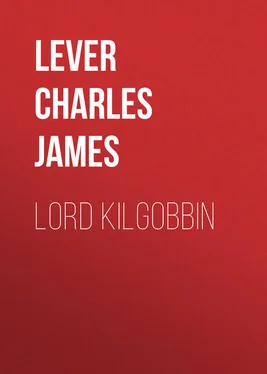Charles Lever - Lord Kilgobbin
Здесь есть возможность читать онлайн «Charles Lever - Lord Kilgobbin» — ознакомительный отрывок электронной книги совершенно бесплатно, а после прочтения отрывка купить полную версию. В некоторых случаях можно слушать аудио, скачать через торрент в формате fb2 и присутствует краткое содержание. Жанр: literature_19, foreign_antique, foreign_prose, на английском языке. Описание произведения, (предисловие) а так же отзывы посетителей доступны на портале библиотеки ЛибКат.
- Название:Lord Kilgobbin
- Автор:
- Жанр:
- Год:неизвестен
- ISBN:нет данных
- Рейтинг книги:3 / 5. Голосов: 1
-
Избранное:Добавить в избранное
- Отзывы:
-
Ваша оценка:
- 60
- 1
- 2
- 3
- 4
- 5
Lord Kilgobbin: краткое содержание, описание и аннотация
Предлагаем к чтению аннотацию, описание, краткое содержание или предисловие (зависит от того, что написал сам автор книги «Lord Kilgobbin»). Если вы не нашли необходимую информацию о книге — напишите в комментариях, мы постараемся отыскать её.
Lord Kilgobbin — читать онлайн ознакомительный отрывок
Ниже представлен текст книги, разбитый по страницам. Система сохранения места последней прочитанной страницы, позволяет с удобством читать онлайн бесплатно книгу «Lord Kilgobbin», без необходимости каждый раз заново искать на чём Вы остановились. Поставьте закладку, и сможете в любой момент перейти на страницу, на которой закончили чтение.
Интервал:
Закладка:
Anything short of Kate Kearney’s fine temper and genial disposition would have broken down by daily dealing with this cross-grained, wrong-headed, and obstinate old fellow, whose ideas of management all centred in craft and subtlety – outwitting this man, forestalling that – doing everything by halves, so that no boon came unassociated with some contingency or other by which he secured to himself unlimited power and uncontrolled tyranny.
As Gill was in perfect possession of her father’s confidence, to oppose him in anything was a task of no mean difficulty; and the mere thought that the old fellow should feel offended and throw up his charge – a threat he had more than once half hinted – was a terror Kilgobbin could not have faced. Nor was this her only care. There was Dick continually dunning her for remittances, and importuning her for means to supply his extravagances. ‘I suspected how it would be,’ wrote he once, ‘with a lady paymaster. And when my father told me I was to look to you for my allowance, I accepted the information as a heavy percentage taken off my beggarly income. What could you – what could any young girl – know of the requirements of a man going out into the best society of a capital? To derive any benefit from associating with these people, I must at least seem to live like them. I am received as the son of a man of condition and property, and you want to bound my habits by those of my chum, Joe Atlee, whose father is starving somewhere on the pay of a Presbyterian minister. Even Joe himself laughs at the notion of gauging my expenses by his.
‘If this is to go on – I mean if you intend to persist in this plan – be frank enough to say so at once, and I will either take pupils, or seek a clerkship, or go off to Australia; and I care precious little which of the three.
‘I know what a proud thing it is for whoever manages the revenue to come forward and show a surplus. Chancellors of the Exchequer make great reputations in that fashion; but there are certain economies that lie close to revolutions; now don’t risk this, nor don’t be above taking a hint from one some years older than you, though he neither rules his father’s house nor metes out his pocket-money.’
Such, and such like, were the epistles she received from time to time, and though frequency blunted something of their sting, and their injustice gave her a support against their sarcasm, she read and thought over them in a spirit of bitter mortification. Of course she showed none of these letters to her father. He, indeed, only asked if Dick were well, or if he were soon going up for that scholarship or fellowship – he did not know which, nor was he to blame – ‘which, after all, it was hard on a Kearney to stoop to accept, only that times were changed with us! and we weren’t what we used to be’ – a reflection so overwhelming that he generally felt unable to dwell on it.
CHAPTER II
Mathew Kearney had once a sister whom he dearly loved, and whose sad fate lay very heavily on his heart, for he was not without self-accusings on the score of it. Matilda Kearney had been a belle of the Irish Court and a toast at the club when Mathew was a young fellow in town; and he had been very proud of her beauty, and tasted a full share of those attentions which often fall to the lot of brothers of handsome girls.
Then Matty was an heiress, that is, she had twelve thousand pounds in her own right; and Ireland was not such a California as to make a very pretty girl with twelve thousand pounds an everyday chance. She had numerous offers of marriage, and with the usual luck in such cases, there were commonplace unattractive men with good means, and there were clever and agreeable fellows without a sixpence, all alike ineligible. Matty had that infusion of romance in her nature that few, if any, Irish girls are free from, and which made her desire that the man of her choice should be something out of the common. She would have liked a soldier who had won distinction in the field. The idea of military fame was very dear to her Irish heart, and she fancied with what pride she would hang upon the arm of one whose gay trappings and gold embroidery emblematised the career he followed. If not a soldier, she would have liked a great orator, some leader in debate that men would rush down to hear, and whose glowing words would be gathered up and repeated as though inspirations; after that a poet, and perhaps – not a painter – a sculptor, she thought, might do.
With such aspirations as these, it is not surprising that she rejected the offers of those comfortable fellows in Meath, or Louth, whose military glories were militia drills, and whose eloquence was confined to the bench of magistrates.
At three-and-twenty she was in the full blaze of her beauty; at three-and-thirty she was still unmarried, her looks on the wane, but her romance stronger than ever, not untinged perhaps with a little bitterness towards that sex which had not afforded one man of merit enough to woo and win her. Partly out of pique with a land so barren of all that could minister to imagination, partly in anger with her brother who had been urging her to a match she disliked, she went abroad to travel, wandered about for a year or two, and at last found herself one winter at Naples.
There was at that time, as secretary to the Greek legation, a young fellow whom repute called the handsomest man in Europe; he was a certain Spiridion Kostalergi, whose title was Prince of Delos, though whether there was such a principality, or that he was its representative, society was not fully agreed upon. At all events, Miss Kearney met him at a Court ball, when he wore his national costume, looking, it must be owned, so splendidly handsome that all thought of his princely rank was forgotten in presence of a face and figure that recalled the highest triumphs of ancient art. It was Antinous come to life in an embroidered cap and a gold-worked jacket, and it was Antinous with a voice like Mario, and who waltzed to perfection. This splendid creature, a modern Alcibiades in gifts of mind and graces, soon heard, amongst his other triumphs, how a rich and handsome Irish girl had fallen in love with him at first sight. He had himself been struck by her good looks and her stylish air, and learning that there could be no doubt about her fortune, he lost no time in making his advances. Before the end of the first week of their acquaintance he proposed. She referred him to her brother before she could consent; and though, when Kostalergi inquired amongst her English friends, none had ever heard of a Lord Kilgobbin, the fact of his being Irish explained their ignorance, not to say that Kearney’s reply, being a positive refusal of consent, so fully satisfied the Greek that it was ‘a good thing,’ he pressed his suit with a most passionate ardour: threatened to kill himself if she persisted in rejecting him, and so worked upon her heart by his devotion, or on her pride by the thought of his position, that she yielded, and within three weeks from the day they first met, she became the Princess of Delos.
When a Greek, holding any public employ, marries money, his Government is usually prudent enough to promote him. It is a recognition of the merit that others have discovered, and a wise administration marches with the inventions of the age it lives in. Kostalergi’s chief was consequently recalled, suffered to fall back upon his previous obscurity – he had been a commission-agent for a house in the Greek trade – and the Prince of Delos gazetted as Minister Plenipotentiary of Greece, with the first class of St. Salvador, in recognition of his services to the state; no one being indiscreet enough to add that the aforesaid services were comprised in marrying an Irishwoman with a dowry of – to quote the Athenian Hemera – ‘three hundred and fifty thousand drachmas.’
Читать дальшеИнтервал:
Закладка:
Похожие книги на «Lord Kilgobbin»
Представляем Вашему вниманию похожие книги на «Lord Kilgobbin» списком для выбора. Мы отобрали схожую по названию и смыслу литературу в надежде предоставить читателям больше вариантов отыскать новые, интересные, ещё непрочитанные произведения.
Обсуждение, отзывы о книге «Lord Kilgobbin» и просто собственные мнения читателей. Оставьте ваши комментарии, напишите, что Вы думаете о произведении, его смысле или главных героях. Укажите что конкретно понравилось, а что нет, и почему Вы так считаете.












